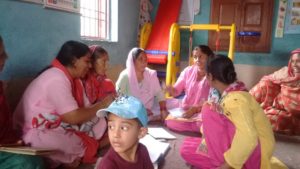Though we claim India to be a progressive nation, the principles, ideologies, culture, customs and practices of rural India speak otherwise. It might be well covered up but roots of a male dominant society exists in both developed urban areas and marginalised rural pockets despite continued efforts, awareness, information and education on secularism and gender equality.
exists in both developed urban areas and marginalised rural pockets despite continued efforts, awareness, information and education on secularism and gender equality.
Women though not confined within four walls are somewhere facing social evils like early marriage, isolation due to myths about menstruation and inferiority in social activities in large number of villages of India. But nobody seems to be talking about it for again ironically it portrays itself as a male dominated society. Amidst the mounting pressure, various social groups, Mahila Mandals, Self-Help Groups and Non-Governmental Organisations (NGOs) are trying to empower women in ways unknown by the world outside.
Women in villages of Himachal Pradesh are now shifting towards being independent, skillful, self-reliant through the efforts of Rural Centre for Human Interests (RUCHI). Since 1983, RUCHI has been working at a local level encouraging, motivating, informing and creating awareness among women through Self-Help Groups (SHGs) in over 10 villages of Himachal Pradesh.
“I always depended on my husband to work and earn because I thought that was how it was supposed to be or at least that was what was told to me. It seemed like the typical practice where the male of  the house works in the field and the female cooks, takes care of the house and children. But when I joined a SHG I realised I can plough the field, sow seeds and reap the harvests too. It is not just a man’s job but women are skilled and can help in farming,” says Avni, a villager of Kandol Gaon.
the house works in the field and the female cooks, takes care of the house and children. But when I joined a SHG I realised I can plough the field, sow seeds and reap the harvests too. It is not just a man’s job but women are skilled and can help in farming,” says Avni, a villager of Kandol Gaon.
Financial dependency is one of the major hurdle faced by most women in villages. But SHGs and Mahila Mandals facilitate women to save, cut down additional expenses and gather some money at the end of every month. Rashi, a villager of Bandh gaon said, “We have a SHG meeting every month where all the women of our village meet to discuss problems faced by us, try and come up with solutions for domestic issues and also save up a minimal amount every month. We save Rs 10 or Rs 50 or even Rs 500 every month and store it in the SHG fund. We then use this money contributed by all women for any emergency situation, borrow a loan or even help a needy member when required.”
Savings through SHGs have encouraged women to save some amount every month and use it for their own good in case of an adversity. Through this continuous process of savings, women do not have to depend on their husbands for finance but can use their own money for good. Hemlata, a villager said, “Till date I did not know the word Independence or Freedom. Now when I have some money I understand what it is to be self reliant and independent. I do not have to beg or ask my husband for money but I can do it on my own and use it whenever according to my own free will.”
Seviral SHGs in different villages of Himachal Pradesh are saving huge amounts and helping each other by providing loans. Shakti, President of SHG of Sandoli Village, said, “We use these loans for various activities like marriage, house repair, education of children, buying sewing machines, utensils, agricultural equipments, cattle, seeds or furniture. We are self reliant and can take our own decisions and I think that is what is the true essence of empowerment.”
Some SHGs have saved Rs 20,000 a month and are lending loans to other women for various activities. Pushpalata, a community health motivator of RUCHI, said, “When we began SHGs in various villages women were reluctant and hesitant. They did not want to adopt a new way of living or initiate change. But now they are committed and dedicated to SHGs as these groups help them gain financial freedom, develop their personality and also help find solutions to daily problems. Women are finally talking openly about the problems they face and it is a big step in a rural cultural settlement.”
RUCHI has been working in various sectors like women empowerment, community health, water conservation, education, environment protection, stop climate change, technology promotion for agriculture, organic farming, waste management and income generation for women. International volunteers and interns from different parts of India work for RUCHI on various projects for a designated period to help create rural development.
Income generation activities like handicrafts, embroidery, stitching, weaving, basket making, leaf plate making, handkerchief creation, pottery, handlooms, blanket and shawl creation are other activities initiated among women groups by RUCHI. Sana Banu, a volunteer said, “I interned with RUCHI and was amazed to see the kind of skills that every woman possessed despite emerging from a marginalised village. I attended SHG meetings and realised women knew the importance of finance and would dedicatedly save money. In fact, women were also involved in various social, commercial and creative activities for income generation apart from farming.”
